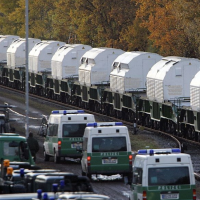Lawsuit Seeks to Block Energy Dept.’s Huge Nuclear Waste Transport from Canada to U.S.
 Nuclear waste transport train, used in Germany (photo: Carsten Koall, Getty Images)
Nuclear waste transport train, used in Germany (photo: Carsten Koall, Getty Images)
By Britain Eakin, Courthouse News Service
WASHINGTON (CN) - The U.S. Energy Department's unprecedented proposed transfer of "a toxic liquid stew" containing nuclear waste between Canada and the U.S violates federal law, seven environmental groups claim in court.
The proposed $60 million deal would see more than 6,000 gallons of the liquid waste transported more than 1,100 miles from the Fissile Solutions Storage Tank at Chalk River in Ontario, Canada to the Savannah River Site in South Carolina, according to a 47-page lawsuit filed Friday in Washington, D.C., Federal Court.
"The radioactive waste byproducts resulting from processing the HEU targets at Chalk River are acknowledged to be among the most radioactively hazardous materials on Earth," the complaint states, abbreviating highly enriched uranium. "They would be more easily dispersed into the environment in liquid form than in solid form, in the event of a breach of containment during transport."
The material in question, highly enriched uranyl nitrate liquid, or HEUNL, comes from Canadian production of medical radioisotopes with highly enriched uranium provided by the Energy Department.
"The targets are irradiated in a nuclear reactor and then dissolved in nitric acid so that certain useful medical isotopes can be chemically extracted from the liquid solution," the complaint states, which environmental groups say results in a highly radioactive liquid waste that contains dangerous radioactive byproducts of nuclear fission.
According to the complaint, which names the Energy Department as the primary defendant, the transport will take several years and will require 150 separate trips.
The lawsuit alleges that the Energy Department wrongly designated the liquid waste, which contains dozens of radioactive compounds often present in irradiated nuclear fuel. The liquid also contains small amounts of highly enriched uranium, "which is nuclear weapons usable material," the environmental groups claim.
"Thus the material to be shipped is functionally equivalent to liquid high-level radioactive waste that results from dissolving spent nuclear fuel in nitric acid for the purpose of reprocessing," the complaint states.
The conservationists say the liquid waste is similar to that being stored at Washington state's Hanford Nuclear Reservation, which has never been transported in liquid form over public roads.
The complaint calls the public and environmental health dangers of the liquid waste "significant and in some cases even legendary." Some of it could easily enter the food chain and be absorbed into muscle and organ tissues, the groups say.
Additionally, the lawsuit warns that the liquid waste requires careful monitoring and constant mixing to prevent the highly enriched uranium from becoming more concentrated, which in a worst case scenario could rupture the tank and release the material into the environment.
"The import and transport of highly radioactive liquid waste is being justified under a U.S.-Canada agreement to return highly enriched uranium to the United States. However, shipping of high-level radioactive waste in liquid form over public roads has never occurred in the 75-year history of U.S. nuclear power, research, medical isotope production, and weapons programs," the complaint states.
The environmental groups argue that other alternatives exist. The liquid waste can be solidified and stored at Chalk River, or it can be converted or "down-blended" so that it contains low-enriched, non-weapons grade uranium, which the Energy Department has said is a viable option, according to the complaint.
The groups that filed the lawsuit - Beyond Nuclear, Nuclear Information and Resource Service, Savannah River Site Watch, Citizens for Alternatives to Chemical Contamination, Lone Tree Council, Sierra Club and Environmentalists Inc. - are asking the Energy Department to thoroughly analyze down-blending as an option for dealing with the waste.
According to the lawsuit, the agency has not compiled an environmental impact statement on the proposed shipments, which federal law requires it to do.
Instead, the agency published and adopted as policy its own analysis of the risks, which it determined are similar to transporting other nuclear material, the complaint says, thereby circumventing public notification and comment requirements.
"The agency found that there would be no significant environmental impacts from the proposed project and provided no meaningful discussion of the potential risks from accident, terrorism, sabotage and the associated possible breach of the transport container," the lawsuit states.
The environmental groups seek a temporary restraining order and preliminary and permanent injunctions against the transport plan until the Energy Department compiles an environmental impact statement and complies with the National Environment Policy Act, the Atomic Energy Act and the Department of Energy Organization Act.
The Energy Department declined to comment.
Terry J. Lodge, attorney for the environmental groups, did not respond Monday to an emailed request for comment.
To Learn More:
Railroad Regulators Fail to Pursue Criminal Prosecution of Hazardous Cargo Safety Violations (by Joan Lowy, Associated Press)
Internal Audit Criticizes CBP Field Operations for not Testing Rail Cargo from Canada and Mexico for Radiation (by Noel Brinkerhoff, AllGov)
Edison Has “Short-Sighted” Plan for Indefinitely Burying San Onofre Nuclear Waste (by Ken Broder, AllGov California)
Utah Fights to Keep Out Foreign Radioactive Waste (by Noel Brinkerhoff, AllGov)
- Top Stories
- Unusual News
- Where is the Money Going?
- Controversies
- U.S. and the World
- Appointments and Resignations
- Latest News
- Musk and Trump Fire Members of Congress
- Trump Calls for Violent Street Demonstrations Against Himself
- Trump Changes Name of Republican Party
- The 2024 Election By the Numbers
- Bashar al-Assad—The Fall of a Rabid AntiSemite






Comments